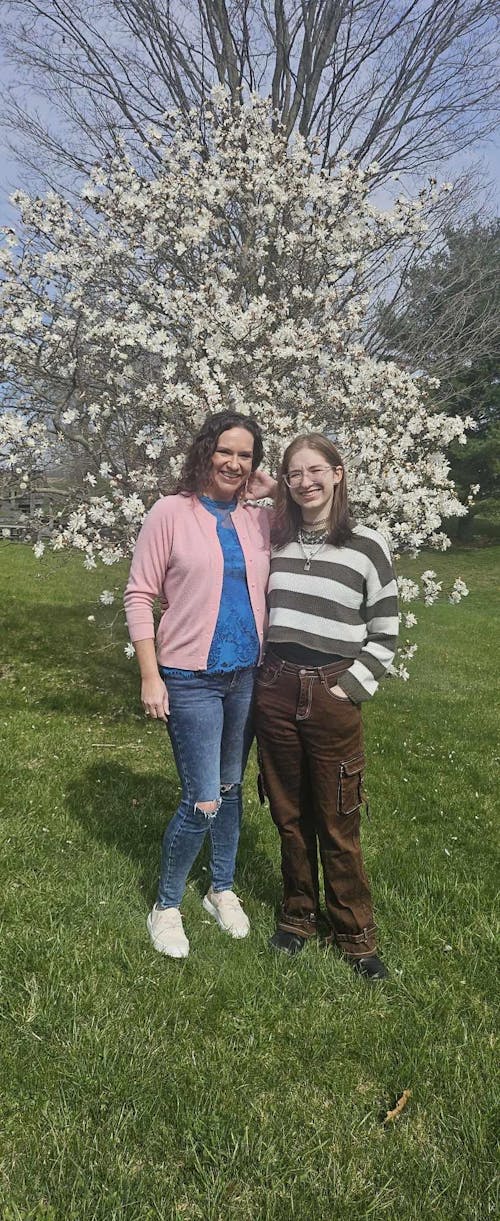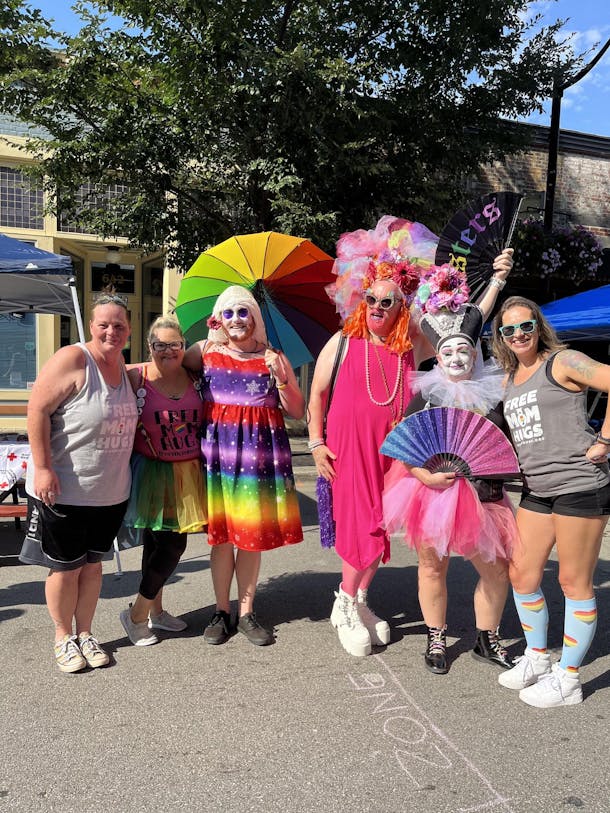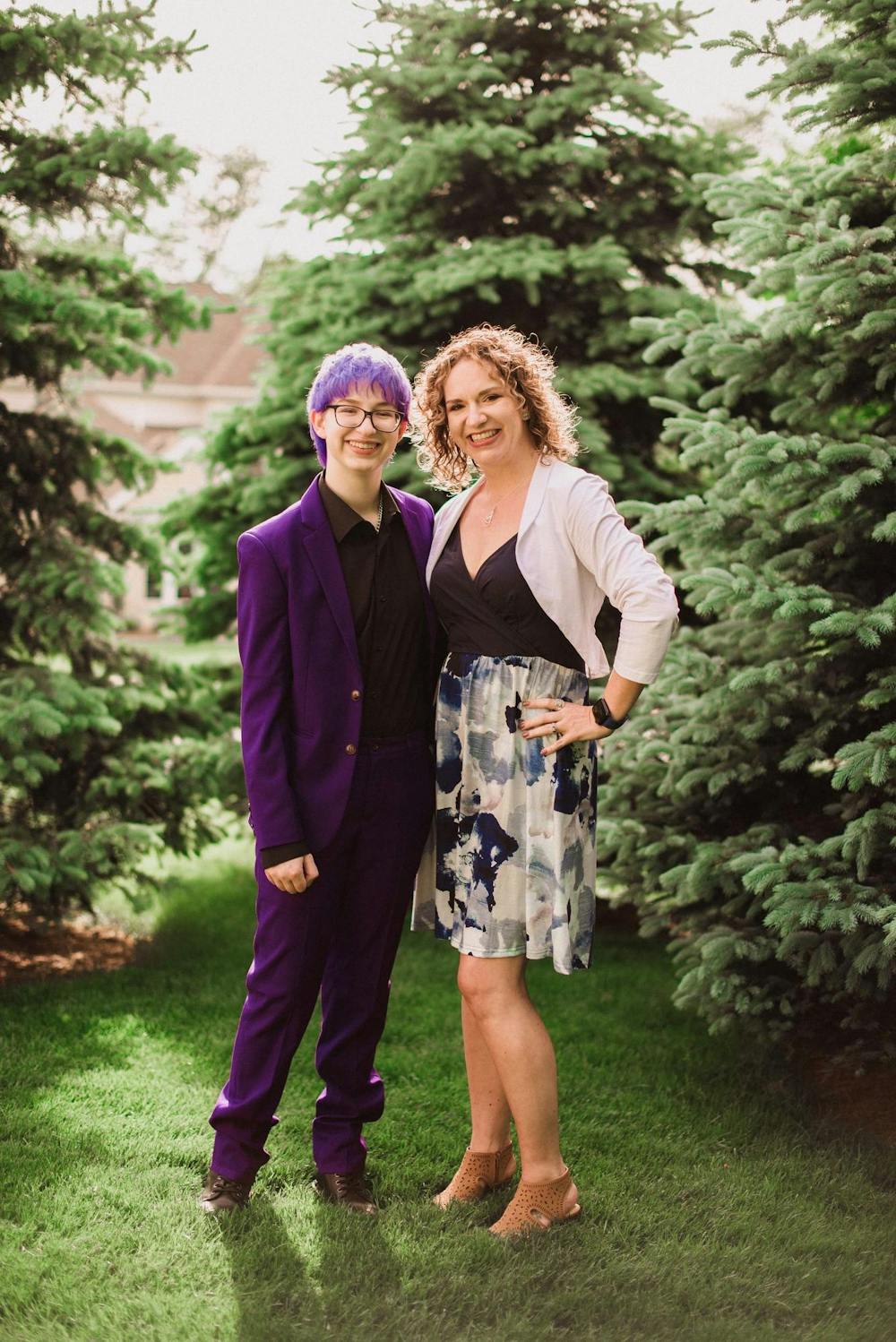A hug can communicate warmth and love without saying a word. For LGBTQ+ individuals rejected by family members, a hug from Free Mom Hugs staff resembles affection they may not receive from those of their own household.
The nationwide organization was founded in Oklahoma by Sara Cunningham in 2015 with the purpose of empowering the lives of LGBTQ+ members in families and communities. For Indiana state leader of Free Mom Hugs Adrianna Randle, a hug is an emotional connection affirming a safe space between both parties.
“I’ve had people tell me, ‘I’ve not had a hug from my mom in four years since I came out as gay, lesbian or transgender,’” Randle said. “That emotional connection — even if it’s just for that couple of seconds to get a hug, to hear a story, to share a laugh — it’s very important to people.”
Free Mom Hugs provides hugs and other methods of support to people in the LGBTQ+ community who might’ve endured rejection or resentment from someone for their identity. For Randle, in the state of Indiana where they said hate and vitriol floats around the LGBTQ+ community, they said the power of a hug flourishes human relationships.
“I don’t think I’ve ever heard anybody saying, ‘No, I hate hugs,’” Randle said. “We all thrive on a human connection and being part of a group where that’s what we do: we hug, we listen, we talk, we laugh, we let you know we’re there.”

Randle said the organization also offers different physical contact forms, such as high fives and fist bumps, depending on each individual’s comfort level.
Sometime after joining Free Mom Hugs, Randle’s oldest son came out as nonbinary, and then, six to eight months later, a transgender male.
“It didn’t change the person that my son is, it changed how the world sees him, and I knew I needed to fight for that,” Randle said.
Randle’s younger son is also a member of the transgender community, and Randle themself is agender and aromantic-asexual. Their identity motivated Randle to grow a deeper understanding of the LGBTQ+ community while expanding their role to support LGBTQ+ individuals, such as their family and themself.
“We all should be allies, all of us,” Randle said. “I’m going to be an accomplice; I’m going to step in and be that buffer between what the cruel, cruel world can say and do to you and your tender little heart.”

Heidi and Alyx Buffenbarger pose for a family Easter gathering photo March 31 2024. Heidi Buffenbarger is a leader at Indiana State for Free Mom Hugs. Photo Provided, Matt Buffenbarger
While Randle said being an ally is a good start, they want to see more people serve as accomplices to the LGBTQ+ community. They said being an accomplice means immersing oneself in what’s going on in the community, empathizing with community members, and doing everything possible to fight for them and LGBTQ+ rights.
“I want to see more people step out of their houses where they can be seen, where they are putting boots on the ground, and standing up for things they know and believe are right,” Randle said. “Standing up for somebody else is what I'm looking for.”
Laura Janney, director of Muncie OUTreach, an LGBTQ+ youth group, was also compelled to expand her knowledge of the community because of family ties. Janney’s son came out as gay to her and her husband when he was young.
“It’s a part of who he is,” Janney said. “We were afraid to tell people because we wanted to protect him. He was only 12 at the time, and we didn’t want him to be shunned or rejected by family.”
As someone who interacts with young LGBTQ+ individuals constantly, Janney’s job is mentoring, listening and being supportive of those learning to accept their identities.
Janney said despite the mixture of political ideology she’s witnessed in Muncie, any advertising of Muncie OUTreach helps boost its impact with the surrounding LGBTQ+ community members.
“I think it's important to have visibility and to let everybody know there is something here and they're not isolated,” Janney said.
Muncie OUTreach welcomes any child, even if they aren’t a part of the LGBTQ+ community. Janney said any differences in beliefs regarding the community allow for opportunities in education.
“Although we pride ourselves on creating safe spaces, I’m not sure there is an actual real thing of a safe space. I think it’s more about safe people,” Janney said. “All the kids who've been here are ready to cancel this kid because his parents have a confederate flag up, but the reality is it’s a teachable moment.”
Like Janney and Randle, Heidi Buffenbarger, another Indiana state leader for Free Mom Hugs, also has children in the LGBTQ+ community. Her children, one being nonbinary and the other transgender, led her to join Free Mom Hugs to support them and understand why they both identified the way they do.

Indiana State Free Mom Hug leaders Heidi Buffenbarger, Melanie Odgers and Adrianna Randle pose for a photo with Pride event attendees September 7 2023. Photo Provided, Adrianna Randle.
“The only thing I want is for my children to be happy, healthy and thriving. And I knew if I didn’t support and understand, then there’s no way that they could be those things,” Buffenbarger said.
When her older nonbinary child came out, being involved in Free Mom Hugs helped Buffenbarger have conversations with her child to help her understand the impact gender identity had on their life.
“It’s one thing to come out to your parents and say, ‘This is who I am,’ [but] it’s another to be able to have ongoing conversations with your parents about what that means to you and how they feel,” Buffenbarger said.
Buffenbarger said she hears of a mixture of supportive and opposing opinions about the LGBTQ+ community from families, but she mentioned some who may view it more negatively could be open-minded to understanding.
“It’s easier when the family member or the parent doesn't necessarily embrace their child, but they want to learn, and if they're open about what that means, then there's room for growth,” Buffenbarger said. “We want to help explain to parents why it’s not wrong … That’s what Free Mom Hugs is all about; Regardless of who you are and how you identify, you love everybody.”
Contact Zach Gonzalez with comments via email at zachary.gonzalez@bsu.edu





The Daily News welcomes thoughtful discussion on all of our stories, but please keep comments civil and on-topic. Read our full guidelines here.